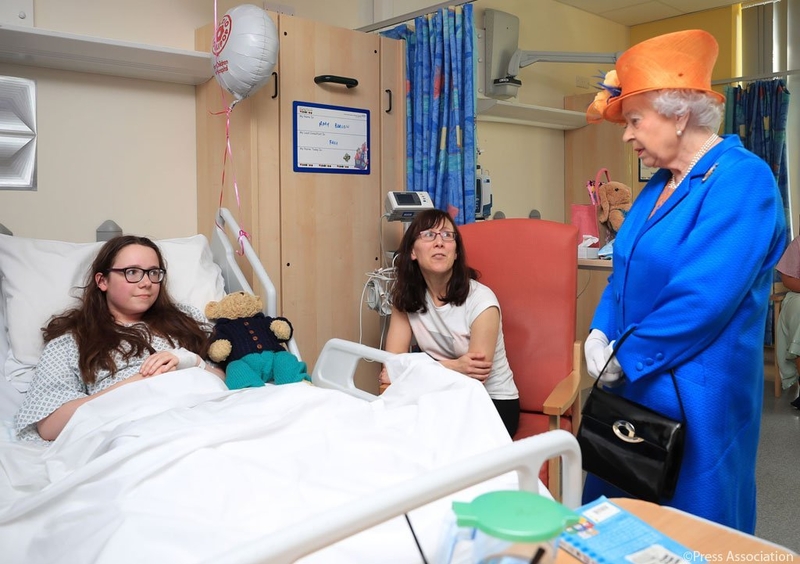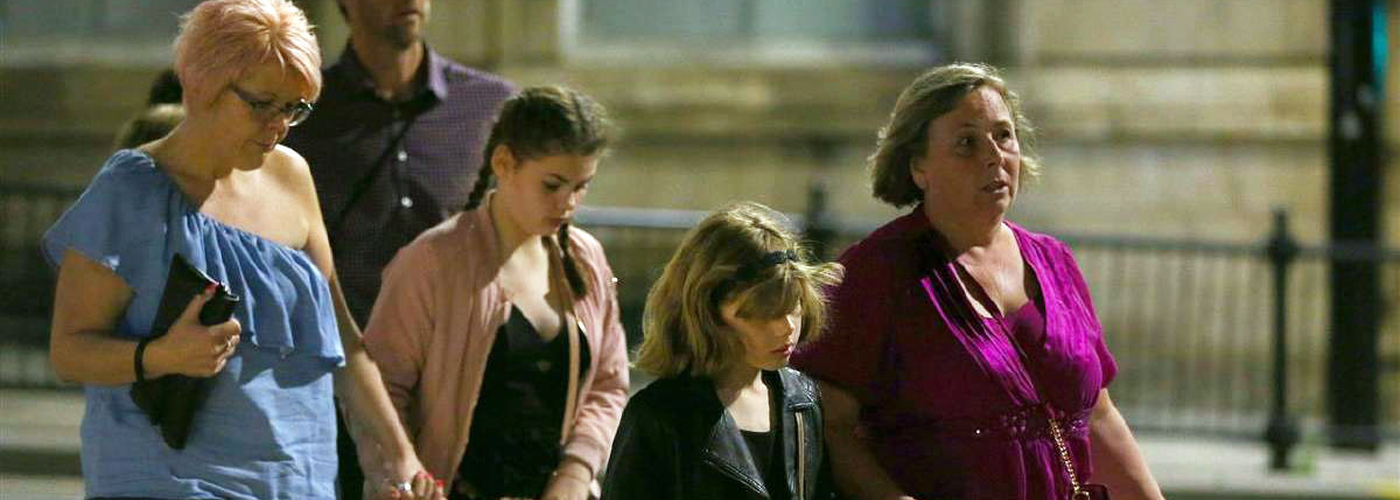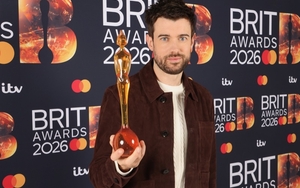Maria Roberts on fighting instinct and letting them regain their independence
It has been a terribly sad week for everyone affected by the Manchester Arena bombing, starting with the families of the 22 who were killed, the 120 injured, the 20,000 at the arena who will carry the trauma forever, the emergency services, the helpers on the streets, the people of Manchester, and not forgetting 23-year-old Ariana Grande.
As the news developed over the past week, time and again we heard that for many young concertgoers this was their first time alone at a concert with friends. Liberated.
On BBC Breakfast a mother said: “Lucy sang to every single song, as did all the other teenagers.” Almost 20,000 fans, all united in their love of Ariana Grande, some with adults along for the ride and some adults together.
Imagine the joy! Imagine the scene.
We have all felt that pure joy. It is the mainstay of our childhood memories. For me, this memory is Michael Jackson’s 1988 Bad tour at Aintree, Liverpool. I remember sitting in my parents’ car, waiting to pick my sister Jenny up: she bounded towards us wearing a Bad bandana, a Bad T-shirt, singing 'I’m bad, I’m bad, you know it I’m bad'. My 15-year-old sister with all the freedom 11-year-old me so desperately craved.

There are myriad reasons why the sadness and trauma of this horrible attack on our young people sinks so deep, why you find yourself unexpectedly crying in the car at the traffic lights, waking up, getting the brew on and crying all over again. It’s a dampness you can’t shake off. We can all imagine the narrative that came with the concert. It is a narrative we have all lived. It’s their story, it’s yours, it’s our story in Manchester, a city in love with music. A city for the youth. A city to grow up in.
For now, I want to talk about the parents.
Every single parent and carer of the children that attended the Ariana Grande concert will have wrestled with 100 decisions. Some will have offered to take a group with them, to sit through pop tunes they’ve already heard a million times, and that have shredded their nerves in the weeks leading up to the concert. Other parents hung around at the box office, anxiously waiting to taxi their kids home. Some of those parents, friends and family members never made it home.
They went to Manchester Arena because they loved these kids, they wanted them to have experiences to call their own. It’s a rite of passage for our children. It’s important.

I am the mother of a teenager, he’s 18 now, an adult. Together we’ve been through the momentous years that are filled with every new experience, every new adventure. From age 13 to 18, as a parent you guide them gently towards independence. You are metaphorically taking the stabilisers off, standing behind, giving them the chance to feel the elation of going it alone. And push.
For our children it is glorious, but this betwixt stage is not easy as a parent. It is gut-wrenching. It is filled with fear. It is terrifying. There are nights you want to lock them in their rooms and never let them out because you simply can’t stand anxiously waiting for them to come home safe, again. Your heart stops beating with every missed call. Every minute past curfew is horrifying. The fear. The dread. It’s relentless.
But our children do come home and gradually you build trust in them and the world just a tiny bit more. You know there is a day looming in the future when you will have to truly let go: their first holiday, university, a flat share.
Many of the victims of Monday's attack, between the ages of eight and eighteen, were just starting out on this journey.
Over the years, people have said to me of my son: “He is a young adult, he can look after himself.” Or: “You have your freedom back!” Any parent will happily admit, you don’t get your freedom back – and nor would you want it. Friendship and family life are woven into a tapestry that keeps on growing.

Leading a child along the pathway into adult life is beautifully rewarding. Through their young eyes, you get to see the world anew again. There are friendships to cherish, strange foods to try, the latest films to fall in love with, celebrities to idolise, first boyfriends and girlfriends, the time they come home pissed with vomit in their hair.
Hearing our children sing lyrics to their first song is no different from hearing them utter their first words. Listening to them dance in their bedrooms, as the ceiling sounds like it may cave in, is no different to watching them take their first steps. Dropping them off at their first big night out, is no different to their first sleepover elsewhere. The feeling doesn't change.
This is the wonder of parenting and of being an adult: children keep us on our feet, their energy, their constant enthusiasm, how they literally jump up and down with excitement because everything is awesome and everything is the best it is ever going to be... until the next thing, that is the best thing. Youth is brilliant.
But this bomb is the worst thing that could happen to our youth. A terrible, terrible, tragedy that has blighted our young people, that has robbed them of that pure joy and murdered their friends. It happened here in Manchester, but also to the young people and their families that travelled to our city from far and wide. It happens the world over.
For now, the bounce has gone. It has gone from us their gatekeepers, their caregivers, their families. There is a sad silence that hangs over us all. We won’t want our young people to leave the house, we will worry even more that they are safe. But, when the time seems appropriate, we must make it possible for our young people to enjoy the best years of their lives. It’s their right.
We will never forget the victims of the bombing at Manchester Arena, we feel for all the survivors, our hearts are collectively breaking. So parents, for a while, if needed, put those stabilisers back on their bikes. But then ever so gently, when the time comes, give them the gentle push they need to head off back to explore the world again.
Twitter @Maria_Roberts
Top Manchester medic offers advice on talking to children about fear
(Issued on behalf of Manchester Health and Care Commissioning Interview with Craig Harris: Executive Nurse and Director of Safeguarding for Manchester Health and Care Commissioning. His role covers protecting some of the most vulnerable people in the city.
Craig, who also has a seven-year-old son, is from Manchester, and up until recently lived just five minutes away from Manchester Arena. Here, he offers suggestions as both a health professional - and as a parent - on how to deal with children’s questions and fears following Monday’s bomb attack.)
“How you broach the subject depends very much on the age of a child. Children are naturally inquisitive and there has to be a balance of how much information you can give based on what you know your child can process.
“Always be honest – and don’t pretend something didn’t happen – especially when they will hear about it from friends, school and the news. We all need to be vigilant at the moment – and that includes our children, so we need to give them the tools to help them.
“The language used is also really important. If, as a parent you call the bomb an ‘incident’ the term won’t mean much to many children and you need to find words that they can relate to.
“In general it’s best to give details in bite-sized chunks – children will be able to guide you and give signals when they are ready to talk, or when they have had enough information. Don’t overload them and be prepared to revisit the topic when they are ready.
“It’s very difficult for any parent to have to talk about anything to do with violence and people being hurt. However, children will hear words like bomb, terror, and suicide no matter how much we as parents want to protect them. They also know when we aren’t telling them the full picture.
“It’s also really important that children know they can ask questions – don’t be afraid to answer them and don’t be afraid to show emotion. We can be strong and talk about an atrocious act – but it’s entirely normal to feel emotional about it.
“For example I told my own son that something awful had happened in Manchester and that it was a terrible thing, and that people had passed away and been hurt. But I also told him that even though this terrible thing has happened everyone who lives here has pulled together- and that we are strong when we support each other like this.
“Visually I was able to explain this to him by showing him a picture of Monday’s vigil, where he could see that true Manchester spirit as thousands of people came together. That picture was very powerful and positive – and a message I want him to remember.
“On a wider level, for those parents looking for advice, I’d like to point out how much help is already out there via helplines and our voluntary and community sector covering all elements of our diverse society. The details of programmes and helplines are attached below.
“We are there to support anyone who needs help, is our message. Professional role aside, I, like any other person who lives here, want to stand united in the face of such loss, as one of the first steps towards a healing process for the city."











